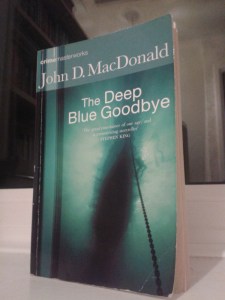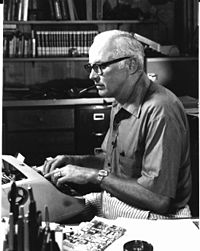I’ve been aware of John D. MacDonald as long as I can remember, for which you can blame my parents. When I was about 5 or 6, the bookcase in our living room had a shelf of colourful, cracked looking paperbacks with titles such as A Purple Place for Dying, Bright Orange for the Shroud (‘Mummy, what’s a shroud?’), One Fearful Yellow Eye, Dress Her in Indigo, The Empty Copper Sea. The colours seemed to echo the children’s books I was reading at the time, and yet – even then, I knew there was something else lurking in there. This was the beginning of my love affair with the written word; and if you want to go the whole hog, you could say that MacDonald is partially responsible for this blog, which is a terrible thing for the man to have on his conscience. Talk about the law of unintended consequences.
 Despite all this, until recently I’d not read anything beyond MacDonald’s titles. Then, during one of my regular charity shop trawls, I came across a copy of The Deep Blue Goodbye, the first book in his Travis McGee series. It felt like a sign; if I was going to read MacDonald, then I should start at the beginning. There are 21 books in the series, all of them with equally vivid titles (a motif by his publisher to make the books instantly recognisable at the airport). Regardless of what you think of MacDonald’s work, you can’t deny he had a real knack for naming it.
Despite all this, until recently I’d not read anything beyond MacDonald’s titles. Then, during one of my regular charity shop trawls, I came across a copy of The Deep Blue Goodbye, the first book in his Travis McGee series. It felt like a sign; if I was going to read MacDonald, then I should start at the beginning. There are 21 books in the series, all of them with equally vivid titles (a motif by his publisher to make the books instantly recognisable at the airport). Regardless of what you think of MacDonald’s work, you can’t deny he had a real knack for naming it.
The Deep Blue Goodbye – as its name suggests – is closely linked with the water. Florida-based McGee lives on a boat, the Busted Flush, which is where we meet him at the beginning of the book. He enjoys the separation from the world that it gives him – ‘draw all the opaque curtains, button the hatches [and] you could be in a rocket beyond Venus, or under the icecap.‘ This splendid isolation is interrupted when McGee is approached by a young dancer, Cathy Kerr, who has had something stolen. These are her father’s ill-gotten spoils of war; and in trying to reclaim them, McGee comes up against a very, very bad man named Junior Allen.
Allen put me in mind of another Junior, Freddy Frenger, from Charles Willeford’s Miami Blues. Both men are ruthless psychopaths, but whereas in Willeford’s book we see much of the action from Frenger’s point of view, in The Deep Blue Goodbye the villain is a more shadowy presence. We don’t meet Junior Allen in person until the last quarter of the book, but by this point we’ve already familiar with the destruction he is capable of causing. The sense of foreboding as McGee gets close to his quarry is palpable, and the climax certainly doesn’t disappoint.
Whilst Allen may be the devil, this is not to say that McGee is an angel, and one of his most appealing attributes is his ambivalence. He is a man who does his best to keep the world at arm’s length, but who also feels compelled to help Cathy. His true reasons for doing so are kept pleasingly open, but they are not solely altruistic. ‘McGee as avenging angel was too much to swallow,’ he says at one point. ‘I hoped to temper vengeance with greed. Or conversely. Either way, it does simplify the rationalizations.‘
‘Vengeance’ is an interesting choice of word, and a darker side to McGee is hinted at throughout the novel. ‘I have been told that when I have been aroused in violent directions I can look like something from an unused corner of hell, but I wouldn’t know about that.‘ Well, I would – there’s a terrific scene in the middle of the book where McGee interrogates a man, stripping and tying him up in a hotel bathroom, and threatening to scald him with the shower. This shows the lengths McGee will go to; he tries to justify his behaviour by describing his victim as ‘a semi-ridiculous banty rooster of a man‘, but there’s also the suggestion that McGee gets some satisfaction from his work, and has employed similar tactics before:
‘A naked man who cannot move or talk, and does not know whether it is night or day, and is not told where he is or how he got there, will break very quickly.’
 It’s interesting to speculate just how much of himself McGee sees in Junior Allen; maybe the fear that they are alike is what drives him to help Cathy Kerr. It reminded me of a great quote from James Ellroy in the Paris Review, comparing Raymond Chandler to Dashiell Hammett. ‘Chandler wrote the kind of guy that he wanted to be,‘ say Ellroy, whilst ‘Hammett wrote the kind of guy that he was afraid he was.‘
It’s interesting to speculate just how much of himself McGee sees in Junior Allen; maybe the fear that they are alike is what drives him to help Cathy Kerr. It reminded me of a great quote from James Ellroy in the Paris Review, comparing Raymond Chandler to Dashiell Hammett. ‘Chandler wrote the kind of guy that he wanted to be,‘ say Ellroy, whilst ‘Hammett wrote the kind of guy that he was afraid he was.‘
I don’t know where MacDonald stands on this spectrum, and how much of himself he put into the character of Travis McGee, but I suspect it doesn’t matter. Having such a complex and often contradictory character at the centre of his books is reason enough to read them. If you need another one, how about the fact that the series has as its backdrop 20 tumultuous years of American history, running up until the publication of the last in the series – The Lonely Silver Rain – in 1985. And for a third, just take a look again at those titles. If you’re not the tiniest bit intrigued by them, then there’s clearly something wrong with you – a point with which my five year-old self would surely agree.

After reading your review it makes me want to read them all again probably after I have read all the Agatha Christie books in chronological order! Really enjoy reading your blog. Keep it up.
Thanks! I really enjoyed reading it
I read a lot of these when I was younger and have been afraid really to try them now they’re being republished in case they’ve become very dated. Your review makes me think I should reconsider…
I think the books probably are very much of their time – there were a few examples where I thought ‘that attitude seems dated’, mostly in McGee’s attitude to women. And yet he is also this engagingly complex character, with more depth than I was expecting, which came as a pleasant surprise.
I read recently that JDM wrote the first 3 McGee books in the space of a year, which seems remarkable. Is it just me, or are authors less prolific nowadays? I think I can feel another blog post coming on…
They used to keep books down to a manageable length which might have helped! These days you need weight-lifting gear (or an e-reader) to tackle most of the novels that come out… 😉
That’s true! The Greek philosopher Callimachus, writing over 2000 years ago, said ‘A big book is a big nuisance.’ And I think I half agree with him